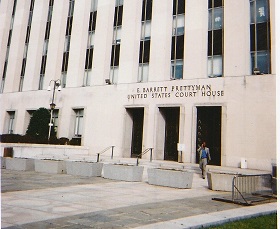Judges Probe FilmOn, Nets On Copyright Issue
The smarter way to stay on top of the multichannel video marketplace. Sign up below.
You are now subscribed
Your newsletter sign-up was successful

To be or not to be defined as an MVPD, that is the question.
A federal appeals court Friday heard argument in the long-running court battle between TV station content providers and FilmOn and, according to an attorney at the lively and lengthy oral argument, both sides had their adherents.
FilmOn says it is the online equivalent of cable system/MVPD and should be eligible for a blanket compulsory copyright license to stream TV content. Fox and the other Big Four TV networks—with the support of the National Association of Broadcasters—have said FilmOn is not entitled to the license and cannot stream TV content without individually negotiating for the rights.
Hearing the case, Fox Television Stations, Inc. v. FilmOn.TV Networks Inc., was a three-judge panel of the court comprising Chief Judge Merrick Garland (Obama's nominee for the Antonin Scalia Supreme Court seat), and Judges Brett Kavanaugh and Patricia Ann Millett.
According to Cory Andrews, senior litigation counsel with the Washington Legal Foundation who was at the argument (WLF filed an amicus brief supporting Fox et al.), the argument went long--almost two hours--and included some lively questioning.
He said that it appeared from that questioning that Millett was more in line with FilmOn, Garland with broadcasters, and Kavanaugh could be the swing vote assuming there is one.
He said Kavanaugh asked tough questions of both sides and appeared to be grappling with whether it is the proper role of the court to create a new over-the-top cable system, rather than Congress.
The smarter way to stay on top of the multichannel video marketplace. Sign up below.
Garland, said Andrews, seemed to be the most likely to view the statute as ambiguous, and because it is ambiguous, that it made sense to defer to the Copyright Office interpretation that a cable system is inherently local.
He said Millet did not appear to see the same ambiguity in the statute language as describing MVPDs as wires and cables or other communications means and that the Internet would seem to qualify as wires and cables and was arguably the preeminent communications tool, so that if the statute is viewed as being drafted with enough
flexibility to account for evolving technology, over-the-top video would seem fit under that definition.
All that is with the caveat that it is difficult to gauge a judge's decision from questioning, since they can play devil's advocate in order to probe and test an argument they might actually agree with.
The lawyer for broadcasters, Neal Katyal from Hogan Lovells, argued that what was at stake was property rights, and that the Copyright Act extends broad protections for copyright holders and provides as very narrow exceptions, including the blanket (compulsory) license.
FilmOn is challenging a lower court decision that deferred to the Copyright Office’s advisory that internet-based retransmission services are not eligible for the license available to cable systems.
On the other coast, FilmOn and Fox et al. are awaiting a ruling from the 9th U.S. Circuit Court of Appeals on a decision by a different lower court judge that FilmOn is eligible for a compulsory license, which would allow FilmOn X (formerly Aereokiller) to deliver TV-station programming from the major networks at a government-set rate, rather than having to negotiate for it individually.
How those decisions are ultimately ruled on in those federal appeals courts could determine whether the Supreme Court gets involved. IF the federal circuits split, one supporting the license the other not, the Supremes would be more likely to take the case if it is appealed there.
The High Court has already ruled in a similar case, ABC v. Aereo that Internet transmissions are public performances and require a copyrightholder's permission, rather than being covered by a blanket license.
The Copyright Office has previously, if tentatively, held that over-the-top services are not subject to the blanket license, but said the FCC could change that if it defined them as MVPDs. Then FCC Chairman Tom Wheeler proposed doing just that, including citing FilmOn as one of the competitive video services such a move would help foster, but he got pushback, including from some in both parties on the Hill, and that definitional initiative was tabled.
Contributing editor John Eggerton has been an editor and/or writer on media regulation, legislation and policy for over four decades, including covering the FCC, FTC, Congress, the major media trade associations, and the federal courts. In addition to Multichannel News and Broadcasting + Cable, his work has appeared in Radio World, TV Technology, TV Fax, This Week in Consumer Electronics, Variety and the Encyclopedia Britannica.

